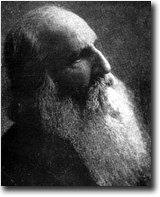Richard Maurice Bucke
Richard Maurice Bucke (1837–1902) was a Canadian psychiatrist who is best known for his exploration of consciousness and his theory of cosmic consciousness. Bucke served as the Medical Superintendent of the Asylum for the Insane in London, Ontario, where he implemented progressive treatments for mental illness. His most famous work, Cosmic Consciousness: A Study in the Evolution of the Human Mind (1901), has had a lasting impact on psychological and spiritual literature.
Early Life and Education[edit | edit source]
Richard Maurice Bucke was born on March 18, 1837, in Methwold, Norfolk, England, and emigrated with his family to Canada when he was a year old. They settled on a farm near London, Ontario. Bucke's early education was sporadic, but he developed a keen interest in literature and the natural world. At the age of 16, he left home to explore the American frontier and later traveled to Europe and the Middle East.
In 1860, Bucke enrolled in McGill University's Medical School in Montreal, where he graduated with an M.D. in 1864. His experiences and observations during his travels, particularly in the hospitals and asylums he visited, deeply influenced his future work in psychiatry.
Career[edit | edit source]
After completing his medical degree, Bucke practiced medicine in Sarnia, Ontario, for several years. His interest in mental health led him to pursue further studies in this field. In 1877, he was appointed the Medical Superintendent of the Hamilton Asylum for the Insane in Ontario. In 1877, Bucke moved to the London Asylum for the Insane in Ontario, where he would work for the remainder of his career.
Bucke introduced several reforms at the London Asylum, emphasizing the importance of compassion, outdoor activities, and occupational therapy for patients. He was an early advocate for the humane treatment of the mentally ill and sought to improve the conditions within psychiatric institutions.
Cosmic Consciousness[edit | edit source]
Bucke's philosophical and psychological interests culminated in his writing of Cosmic Consciousness. In this work, he proposed that there is a higher state of consciousness beyond the ordinary awareness of humans. According to Bucke, individuals who achieve cosmic consciousness gain a deeper understanding of the universe and a sense of immortality. He cited examples of historical figures, including Jesus Christ, Buddha, and Walt Whitman, whom he believed had attained this state.
Cosmic Consciousness has influenced a wide range of thinkers and writers in the fields of psychology, spirituality, and new age thought. Bucke's ideas on consciousness and the evolution of the human mind continue to be studied and debated.
Death and Legacy[edit | edit source]
Richard Maurice Bucke died on February 19, 1902, after slipping on a patch of ice and sustaining a head injury. His contributions to psychiatry and his philosophical writings, especially Cosmic Consciousness, have left a lasting legacy. Bucke's work is often cited in discussions of consciousness, spirituality, and the potential of the human mind.
Selected Works[edit | edit source]
- Cosmic Consciousness: A Study in the Evolution of the Human Mind (1901)
See Also[edit | edit source]
This article is a psychiatry-related stub. You can help WikiMD by expanding it!
Search WikiMD
Ad.Tired of being Overweight? Try W8MD's physician weight loss program.
Semaglutide (Ozempic / Wegovy and Tirzepatide (Mounjaro / Zepbound) available.
Advertise on WikiMD
|
WikiMD's Wellness Encyclopedia |
| Let Food Be Thy Medicine Medicine Thy Food - Hippocrates |
Translate this page: - East Asian
中文,
日本,
한국어,
South Asian
हिन्दी,
தமிழ்,
తెలుగు,
Urdu,
ಕನ್ನಡ,
Southeast Asian
Indonesian,
Vietnamese,
Thai,
မြန်မာဘာသာ,
বাংলা
European
español,
Deutsch,
français,
Greek,
português do Brasil,
polski,
română,
русский,
Nederlands,
norsk,
svenska,
suomi,
Italian
Middle Eastern & African
عربى,
Turkish,
Persian,
Hebrew,
Afrikaans,
isiZulu,
Kiswahili,
Other
Bulgarian,
Hungarian,
Czech,
Swedish,
മലയാളം,
मराठी,
ਪੰਜਾਬੀ,
ગુજરાતી,
Portuguese,
Ukrainian
Medical Disclaimer: WikiMD is not a substitute for professional medical advice. The information on WikiMD is provided as an information resource only, may be incorrect, outdated or misleading, and is not to be used or relied on for any diagnostic or treatment purposes. Please consult your health care provider before making any healthcare decisions or for guidance about a specific medical condition. WikiMD expressly disclaims responsibility, and shall have no liability, for any damages, loss, injury, or liability whatsoever suffered as a result of your reliance on the information contained in this site. By visiting this site you agree to the foregoing terms and conditions, which may from time to time be changed or supplemented by WikiMD. If you do not agree to the foregoing terms and conditions, you should not enter or use this site. See full disclaimer.
Credits:Most images are courtesy of Wikimedia commons, and templates Wikipedia, licensed under CC BY SA or similar.
Contributors: Prab R. Tumpati, MD

